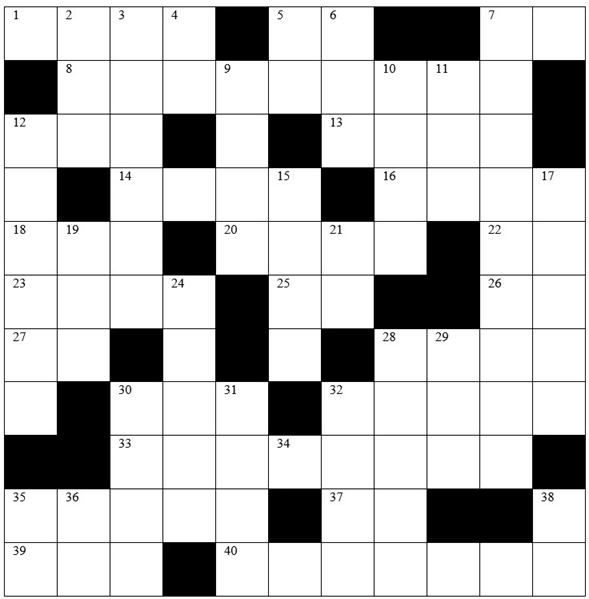|
A PHILOSOPHY CROSSWORD PUZZLE |
A COMPETITION – WIN A FREE BOOK OF YOUR CHOICE FROM LOYEV BOOKS!
E-mail us the solution of this crossword puzzle (scanned or list of answers) by July 20 to Agora (Agoraphilosophy at gmail.com). The first three winners will receive a free book of their choice from Loyev Books (https://philopractice.org/web/loyev-books).
The correct answer will be published on the weekend of July 22 on Agora’s Loyev Books page.

ACROSS
1. For Eric Fromm, _ _ _ _ love is not a feeling but an attitude towards the world. (See Agora’s Topics page www.PhiloPractice.org).
5. A component of the psyche, according to Freud.
7. What is common to the middle of Unamuno, of Montaigne, and of Sartre’s lover.
8. The “philosophical grandson” of Socrates.
12. According to Plato, it is a copy of a copy.
13. Pela _ _ _ _, an Irish British thinker of the 4-5 century AD, who believed in free will as opposed to pre-destination.
14. A British philosopher who did not have an experience of a self. (See Agora’s Topics page www.PhiloPractice.org).
16. A philosophy book titled _ _ _ Homo.
18. One country in which the social philosophy of “Buen Vivir” is developing (shortened name).
20. Half human and half God, according to a wise woman.
22. She was a Russian-American novelist and an egoistic philosopher (initials of first and last name).
23. One of the reasons critiqued by Immanuel Kant.
25. A British “ordinary language” philosopher of the 20th century who denounced “the ghost in the machine” (initials of first and last name).
26. A Harvard professor of political philosophy who called for a minimal state (initials of first and last name).
27. The field of the Agora website.
28. A prefix that turns physics into a field of philosophy.
30. One of the four elements according to Empedocles.
32. A sociologist and philosopher who wrote about protestant ethics.
33. A major Neo-Platonist (See Agora’s Topics page www.PhiloPractice.org).
35. According to Hermann Hesse, they can teach us a lot.
37. The Philosophy of __ by French philosopher Gaston Bachelard.
39. Diogenes threw one of them into Plato’s academy.
40. A 19th century English philosopher of evolution.
DOWN
2. Jacques Derrida’s book The _ _ _ of the Other, about speech, voice, reading, writing, and the Other.
3. The first name of a very pessimistic philosopher (See Agora’s Topics page www.PhiloPractice.org).
4. A Belgian-French feminist philosopher and psychoanalyst, author of This Sex Which is Not One. (Initials of her first and last name).
5. For Buber, if not You then _ _ (See Agora’s Topics page www.PhiloPractice.org).
6. The ancient Cynic school of philosophy received its name from a Greek word which means…
7. This thinker discovered that he existed.
9. A quantifier in logic, which is read as: “There is an X such that…”
10. Items of clothing, which Quine or Adorno or Dewey would wear, but not Parmenides or Heraclitus or Zeno.
11. _ _ _ retius, an ancient thinker who wrote a poem about death (See Agora’s Topics page www.PhiloPractice.org).
12. A city in Syria in which the great 10th century philosopher Al Farabi, “the second master” (after Aristotle), lived for a while.
15. Between Cogito and sum.
17. What is common to philosophers Williams, Lonergan, and Bolzano: B _ _ _ _ _ d.
19. When Socrates was in prison, he was given a _ _ _.
21. Kierkegaard’s Either/_ _ (See Agora’s Topics page www.PhiloPractice.org).
24. Rousseau’s imaginary student (See Agora’s Topics page www.PhiloPractice.org).
28. He discussed with Socrates the nature of virtue.
29. Immanuel Kant was not only a philosopher. In astronomy, he developed the theory that the sun originated as a n_ _ _ la.
30. What a philosopher would use for his work before the invention of the computer.
31. David _ _ _ _, a Scottish philosopher who believed in ethical intuition (See Agora’s Topics page www.PhiloPractice.org).
32. What Socrates drank in the Symposium.
35. Author of Leviathan (initials of first and last name).
36. A prefix, which begins a word that normally means “making smaller,” but in philosophy it means translating one level of reality into a more basic level of reality (for example, psychology to biology).
38. An important British philosopher and logician, married four times, a conscientious objector against war (initials of first and last name) (See Agora’s Topics page www.PhiloPractice.org).
